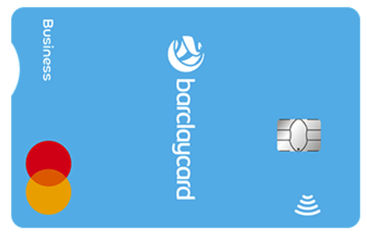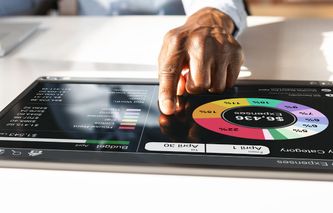A business credit card could help your business with a variety of goals. Whether you want to borrow flexibly, issue employee cards, track expenses, or earn rewards—a business credit card could be just what you need.
After thorough research, we have hand-picked the best business credit cards in the UK for your banking needs. Capital on Tap tops our list. It provides below-average APRs, a transparent fee structure, and bonus points for paid members.
You will also learn about rewards, cashback, eligibility criteria, credit scores, and much more!
What Are the Best Business Credit Cards in 2024?
8 Best Business Credit Cards Compared & Reviewed in 2024
Best Overall: Capital on Tap
Best Rewards: American Express Business Gold Card
Best for Higher Limits: Moss Corporate Business Credit Card
Best for Managing Expenses: Soldo Company Card
Best for Low Fees, APR: Metro Bank Business Credit Card
Best for Cashbacks: Santander Business Cashback Credit Card
Best for Small Businesses: American Express Basic Business Card
Best for Discount and Rebates: Barclaycard Select Cashback Business Credit
- Enjoy an interest-free period of up to 42 days
- Integrate with accounting software like Sage and Xero
- Higher credit limit based on creditworthiness
- 24/7 support over the phone
- Preload the card with your funds to maximise cashback
- Spend instantly upon approval using virtual cards
- Variable interest rates based on credit health
- Avios travel points are only for paid Business Reward customers
- Business must be a private limited company or limited liability partnership
- APR starts at 35.99% for cash advances
Capital on Tap has all the spending features you need for a happy and healthy business. With credit limits up to £250,000, it is designed for small businesses with an annual turnover of above £24,000. There are no annual fees or hidden charges. Plus, the card offers a ton of benefits, starting with 1% cashback on all spending.
You earn 1 point for every £1 spent. Convert points into cash or exchange them for discounted gift cards. Not only that, points can be used for employee rewards or to pay your outstanding business credit card balances.
Save your business even more money with Capital on Tap by avoiding forex or ATM fees. This makes it an ideal option for international businesses. Their flexible repayment options could be a boon in times of cash crunch. What’s more, interest rates start from 15.5%, much lower than the average UK card rates.
You can even offer free, unlimited cards to your employees and control card features like spending limits directly from the mobile app. Know that you must be an active director or have a majority stake in the business to be eligible; both of whom must be UK-based.
- No preset spending limit or interest rates
- Interest-free period on purchases for up to 54 days
- No annual fee for the first 12 months
- Range of insurance options and protections
- Multiple ways to boost reward points.
- Must clear outstanding balances to avoid interest fees.
- 2.99% of the transaction amount on non-sterling transactions.
- High threshold for tapping some reward bonuses.
- A statement copy costs £2
This card from Amex is designed to handsomely reward business owners. As a welcome bonus, you get 40,000 reward points if you spend at least £6,000 in the first three months of membership.
Another 20,000 points await you when you swipe the card between 14 and 17 months of membership. You can earn 10,000 extra points every quarter if your quarterly business spending reaches £20,000. Remember to clear your outstanding balance in full each month to avoid fees.
Referring the card to someone can help you bag another 9,000 points. Daily transactions fetch 1 point for every £1 spent on eligible purchases, without any upper limit.
The rewards look unending, but what can you do with them? You can reinvest them into your business to help your bottom line. Points can also be redeemed against office supplies, gift cards, online advertising, travel, or rewarding employees.
You can issue 20 cards for free to your employees and monitor their spending, set limits, or freeze accounts. As they use the AMEX card, the rewards keep coming in.
- Extremely safe
- Automated invoicing and accounting to save a lot of time
- High monthly credit limit
- Integration with most UK accounting software
- Must book a demo to understand plan pricing
- Low cashback rewards
- Monthly subscription fees
If your business employs over 10 workers or has an annual turnover of more than £2 million, the Moss Corporate Business Credit Card could fit right in with your business operations. With the latest security features, Moss is serious about protecting corporate data.
Similar to business charge cards, you don’t pay any interest fees if you clear all outstanding balances every month. Also, Moss’ business credit card offers a maximum monthly credit limit of £2.5 million, with flexible repayment options of up to 60 days.
With the option to integrate with leading accounting software, Moss’ cutting-edge receipt capture algorithms automate accounting to make data entry simpler, accurate, and hassle-free.
You can issue unlimited physical or virtual business credit cards to your employers in a few clicks. At the same time, you have full oversight over those cards and can even view all expenses they make in real time. So you’ll have complete control over company cashflow.
Meanwhile, the bigger your transactions, the higher your chances of earning cashback rewards. A competitive forex fee of 2% can work great if you engage in overseas transactions. However, Moss requires you to sign up for a subscription plan and doesn’t reveal fee details unless you book a one-to-one demo.
- Secure environment for business transactions
- Useful bookkeeping and expense reporting tools
- Available on both app and desktop
- Easy to get approved
- You can get a free trial
- Low spending limits
- Monthly subscription plans
- Fees for each card issued
- Basic plan limits the number of cards that can be issued
- 1% fee for ATM withdrawals
The Soldo Company Card is a prepaid business card that doesn’t require a credit check. This makes it the perfect choice for small or new businesses, or those with poor credit health.
You can secure cards for yourself and employees and fund them at no cost. These cards offer business owners instant control over company transactions. You decide who gets to spend how much with custom limits. If you notice anything fishy, simply freeze the smart card in a few clicks.
If you use accounting software, you can integrate it with Soldo to eliminate manual tasks while ensuring accurate data capture. They offer monthly subscription plans starting at £21. The basic plan lets you issue up to 20 cards to your employees, with each plastic card costing £5. Their dedicated support team offers you guidance every step of the way.
Soldo also helps your bottom line with no fees for funding your card or making domestic transactions. However, you pay 1% of the transaction amount for foreign transactions. Regulated by the Financial Conduct Authority, Soldo complies with the highest data security standards.
- One of the lowest APRs on the market
- No fees charged for transfers in Europe
- Card issuance is instant
- The service provided by Metro has won awards
- A dedicated customer support team is available to help
- 2.99% + £1.50 fee for cash withdrawals outside Europe
- No rewards or points system
- Requires a business account with Metro Bank
- Requires online banking access to make online card transactions
- Only 9 cardholders from one business account
This business card requires you to have a business current account with Metro Bank. It’s a real money saver, though. Metro Bank has no annual fees and free transactions and cash withdrawals almost everywhere in Europe. There’s also no fee for card purchases in Europe.
What’s unique is that Metro Bank applies a 18.9% APR for all customers, lower than the market average. If the rate varies, it does so for all. To improve flexibility in business cashflow, you can leverage Metro’s interest-free period of up to 56 days on purchases if you make timely repayments in full.
You must make monthly minimum payments of £20 or the balance if below the threshold. Also, there’s no upper credit limit, subject to status.
- Uncapped cashback directly deposited into account
- No foreign transaction fee when paying in local currency
- No credit limit subject to status
- 18.9% interest rate on purchases
- Hotline to a dedicated complaints team
- You need a current account with Santander
- Cards for employees are limited
- Overlimit fees, returned payment fees, and trace fees apply
- No point rewards system
Santander's business credit card keeps things straightforward. It earns you 1% cashback on eligible purchases and deposits the amount directly to your account every month. There’s no limit to how much you can earn in cashback.
If you clear your outstanding balances in full each month before the due date, you can avoid paying money towards interest payments altogether. Santander offers an interest-free period of up to 56 days. The minimum payment you need to make every month is 1% of the outstanding balance or £5, whichever is greater.
You require a business current account with Santander to apply for this card, which involves a hard inquiry on your credit report. If approved, you can issue up to four cards for your business partners using the same account.
You should know that you'll incur a fee of 3% on cash and balance transfer transactions. However, you'll avoid fees for foreign, non-sterling purchases when paying in the local currency. For your peace of mind, the money you deposit in Santander’s business account is protected up to £85,000 by the Financial Services Compensation Scheme (FSCS).
- No annual fee or charges for domestic transactions
- No minimum business turnover requirement to be eligible
- Up to 42 days of interest-free period
- Spending limit can be imposed without prior notice
- No rewards or points system
- You pay £2 for a copy of statements
If you are a new business owner or work as a sole trader, the Amex Basic Business Card could be a great start. With no annual fees, you can manage your cash flow better with an interest-free payment period of up to 42 days. There’s no APR as it is a charge card.
As you scale your business and add new employees, you can issue up to 20 credit cards for free. With a dynamic spending limit, the amount of credit you can use every month has a good chance of increasing if you make timely payments.
You can track business expenses and inflows using the Amex app and manage all accounts in one place. If you carry out a non-sterling transaction, a 2.99% fee on the converted amount applies.
- Generous cashback offer
- Discounts with participating merchants
- Award-winning business credit card
- Enjoy up to 56 days of interest-free payment period on business purchases
- You pay £3 for a statement copy and 3% of the amount for cash advances
- Might require a high credit score for approval

If your business has an annual turnover of more than £10,000, the Barclaycard business credit card allows you to earn 1% cashback on transactions, which is credited directly to your account every month. You can even issue new cards to your employees using the same account for free and watch your rewards rack up as they make business transactions.
Furthermore, Barclays’ partnership with accounting platform Freshbooks allows you to leverage their invoicing and accounting features for free. It usually costs £260 annually.
APR starts at 27.5% based on your borrowing and credit history. You also need to make minimum monthly payments of £5 or 1% of the outstanding balance, whichever is higher. If you miss it, you could be slapped with a £12 fine as a late payment fee. You will also be subject to a 2.99% fee on non-sterling transactions.
How We Picked & Tested the Best Business Credit Cards
We conducted extensive research based on several parameters to handpick these business credit cards. We focused on the needs and requirements of UK businesses of any scale. We sourced the latest data from verifiable sources so that you can make well-informed decision for your business and employees.
Here are some of the top factors we focused on:
Expense management and accounting integration: Every business needs to know where its money is going and prepare for tax. We looked for cards with extra features like receipt capture and a Xero integration.
Annual Percentage Rate (APR): This could have a huge impact on your business expenses if you borrow money. We found cards with the most competitive rates, including ones with interest-free periods or no APR.
Rewards and Cashback offers: Earning money while you spend is an attractive proposition. We selected cards with some of the most generous rewards programmes around.
Security features: Your business worked hard to build funds—of course, you want to keep them safe. We chose cards from regulated providers with the latest security technology.
Eligibility criteria: Clearly a card is of no use to you if your business isn’t eligible. We included cards with a variety of eligibility criteria, so there should be something for you whatever the size of your business.
Fees: Pesky fees are the bane of any business. We’ve tried to help you as much as possible by finding business credit cards with low and transparent fees.
What is a Business Credit Card?
Business credit cards, also called “company credit cards” offer a revolving line of credit similar to a personal credit card. But it is issued in the name of your business. These credit cards are used to pay for business expenses, and help you separate your personal and business expenses.
They often improve business cashflows with interest-free periods on purchases. Timely repayments also help you build a solid business credit history. Good credit health can help you secure higher credit limits or business loans in the future.
How Does a Business Credit Card Work?
Purchases made using a business credit card work similar to personal credit cards.
You pay interest on your outstanding balance, receive statements at the end of each billing cycle, and have to make monthly minimum payments to stay in good standing with the lender. If you manage to repay your outstanding business credit card balance in full, you are seldom charged any interest on eligible purchases. However, carrying a balance would mean accruing interest on your outstanding.
You can issue employee cards on the same account, set limits on them, and control cash flow easily.
What Are the Benefits and Risks of Business Credit Cards?
- Many cards come with no annual fees or transaction fees
- Higher maximum credit limit and lower rates if your business has good credit health
- Employee cards, expense tracking features, and interest-free payment periods promote transparent fund management
- Lucrative sign-up bonuses, cashback offers, and rewards systems
- If you are a sole trader or a new business, the lender could ask for personal guarantees
- Business credit cards don’t have the protections that consumer cards do under Section 75 of the Consumer Credit Act
- Debt could become costly in the case of inconsistent or late repayments, affecting your business margins
- Chances of fraud exist despite security measures
What Types of Business Credit Cards Are Available?
Cashback business credit cards: These credit cards earn you a percentage of your transactions as cashback. Some lenders will directly credit the cashback into your account every month. Capital on Tap, for example, provides 1% cashback on all spending.
Rewards business credit cards: Some business credit cards come with attractive sign-up rewards, which are generally in the form of points. These can also be earned on purchases. Reward points can be used in many ways. You can convert them into cash, use them for travel booking or dining out, or exchange them for discounted gift cards. With Capital on Tap, you'll get exclusive offers, gift cards, and Avios points.
Bad credit business credit cards: If you are a sole proprietor or if your business has faced financial issues leading to missed repayments in the past, it could become difficult to get approved for a business credit card. Some lenders cater to businesses with bad credit health with credit cards that have easy terms but with limited or basic features. Securing these cards can be easy, and is a good option if you want to improve your business credit score.
Low-interest rate cards: These cards don’t charge you interest on purchases during the introductory phase or come with low APRs, especially if your business has a good credit score. For example, Capital on Tap has an interest-free period of 42 days and then a low APR of just 15.5%.
Travel business credit cards: As the name suggests, these cards are designed for businesses that require frequent travelling. Your lender could also offer you heavy discounts on hotel bookings, flights, and restaurants. What’s more, travel cards often come with low to zero foreign exchange fees when you use your business credit card abroad.
Frequent flyer business credit cards: These cards allow businesses to make corporate travel rewarding. Purchases on these cards earn you points, which could be used for access to airport lounges, free flights, or upgrading your employees to business class.
How Do You Apply for a Business Credit Card?
Applying for a business credit card could raise an inquiry into your personal or business credit report. This means you should be prepared before you start the application process to avoid having to make multiple applications.
We’ve laid out everything you need to know about the application process below.
Step 1: Select the Right Business Credit Card
Step 2: Get A Copy of Your Personal and Business Credit Reports
Step 3: Check your eligibility
Step 4: Get Your Documents in Order
Step 5: Apply For The Card
Not necessarily. Several lenders require you to have a business current account to apply for business credit cards. However, freelancers or sole traders might use their personal banking accounts to secure a business credit card.
Who Can Get a Business Credit Card?
Given their strong financials, major corporations or medium-sized businesses may find it easier to secure credit cards. At the same time, you could get a business credit card even if you are a small startup, sole trader, or don’t have a registered business.
We also list the best credit cards for start-ups in the UK.
Eligibility Requirements
When applying, most lenders will require you to be aged 18 or above and be a permanent resident. They also need your business to be UK-registered. On top of this, some business credit card providers need you to be a majority stakeholder or a director of the business.
The fundamental criterion to become eligible for a business credit card is generating revenue independently. It could be via a primary job, freelancing, or even a side gig. However, we recommend you register your business to benefit from special tax breaks and business-related perks.
If you are applying for a card that doesn’t need a business credit score or revenue requirements, you might have to offer a personal guarantee. This way, lenders ensure you are personally liable for any outstanding balances on the card.
Yes absolutely. These business credit cards offer easy repayment terms and charge relatively lower fees. Sometimes, they might need personal guarantees from the business owner, given the poor business credit history.
Documents & Details You Need to Supply
When applying for a business credit card, you will be asked to submit both personal and business information.
Personal details often include the following:
Name, date of birth, and nationality
Contact number and email ID
Current residential address
Financial information like your annual personal income
Employment status and employer contact details
Business details include the following information:
Name and nature of business
Company registration number
Registered trading address
Details of stakeholders or directors or partners
Financial details like annual turnover, borrowing history, current liabilities
The lender might request further information for verification of your details and to offer you a fast decision on your application.
Are there eligibility checker tools for business credit cards?
There are many online eligibility checker tools for business credit cards. When you input basic details, these checkers show you the cards that you could be approved for, based on your credit profile and the issuer’s eligibility criteria.
The checker tool carries out a soft inquiry into your business credit report, which doesn’t impact your score. When you apply for the card, the issuer will implement a hard inquiry into your credit profile, which can be seen by other lenders.
In short, yes. Making timely repayments on your business purchases is reported by lenders to credit reporting authorities. A good history of repayments without missing the monthly due dates boosts your business credit score. This, in turn, helps in securing high credit limits and lower APRs.
Do You Need a Business Credit Card And What Can You Use it For?
If you run a large corporation or work as a sole proprietor, you might eventually need to apply for a line of credit to scale operations or manage supply chains. As businesses grow, finances get complex and expense monitoring could become a cumbersome task.
Some business credit cards come with expense management features and integration with accounting software (Capital on Tap can auto-sync with Sage, Xero, and FreeAgent). Most lenders even allow you to issue cards to employees using the same account, where complete spending controls lie with the business owner. These features not only introduce transparency in business finances but also help avoid over-the-limit spending, which could attract additional fees.
If you or your employees travel a lot for work, you could go for a business credit card that rewards business travel. These cards fetch you points on flight and hotel bookings, allowing you to redeem them for fuel costs, air miles, and discounts on other travel-related expenses.
Can You Use a Personal Credit Card for Business?
If you are a freelancer or recently started a business, it might not be on your agenda to get a business credit card right away. You can use your personal credit card for business expenses, and it is completely legal.
However, bookkeeping becomes easier if you can separate personal expenses from business costs, especially when your business grows over time.
If you find yourself with some idle cash, consider getting a business savings account to earn interest on it.
It might if your issuer reports business credit card activity on your personal credit report. When applying for a business card for the first time, lenders might have no other option than to fetch your personal credit report to determine your creditworthiness. Make sure to carefully read your business card agreement to know how much effect it could have on your credit score.
Business Credit Cards vs Personal Credit Cards
Business credit cards often have higher payment limits than personal credit cards.
Personal credit cards typically offer longer 0% APR periods than most small-business credit cards.
Business credit cards offer higher rewards and points for a range of categories compared to consumer credit cards.
Business credit cards generally have higher fees and rates than personal credit cards.
Business credit card applications often involve extensive document verification and authentication, unlike personal credit cards.
How Much Do Business Credit Cards Cost?
Factors like annual fees, late payment fees, finance charges, currency conversion fees, and even statement requests contribute to the overall cost of having and using a business credit card.
Some business credit cards, like Capital on Tap, don’t charge annual fees, while others charge hundreds of pounds per year. Late payment fees range from £0 to over £10. Foreign transaction fees are usually charged as a percentage but may be waived for some cards.
As you can see, some costs are variable in nature. However, you can reduce overall costs by making timely payments every month, and not exceeding the credit limit. Some credit card issuers also let you avoid paying interest on purchases if you make the repayment in full.
What Are the Limits on Business Credit Cards?
The limits on business credit cards depend on several factors like your creditworthiness, business size and financials, as well as the issuer.
Some issuers offer a minimum credit limit of between £500-£1000. Some business cards come with no upper limit, subject to status. If your card has no pre-set credit limit, you can spend as much as you need to. Higher limits can be achieved with a good credit score.
What Perks Can You Get With a Business Credit Card?
There are plenty of perks for having a business credit card, from rewards to cashback. Sometimes, you can even get attractive discounts on making purchases from merchants that have links with your issuer.
Also, some providers offer statement credits to your accounts for tech purchases or for memberships with major retailers or business tools.
How to Choose the Best Business Credit Card
To find the right credit card for your business, you'll need to consider a variety of factors. Some of the most important are outlined below.
Choosing the best business credit card requires you to understand where you’ll be using it the most. Is it going to be for travel or for purchasing electronics and software for your business? Will you be spending much on office supplies if your business involves tons of paperwork?
How Popular Are Business Credit Cards?
The 2024 Small Business Credit Survey from the Federal Reserve Bank revealed that 56% of the businesses surveyed had a credit card. The popularity of business credit cards continues to increase with the evolving fintech landscape that is facilitating faster approvals and easier document verification.
Credit cards were the most commonly used financing product for businesses in 2023, closely followed by loans, and then line of credit.
Not sure whether a credit card is the right choice? We compared the three most common credit lines: explore the differences between overdrafts, loans, and credit cards.
What Are the Alternatives to a Business Credit Card?
If you don’t think a business credit card fits your needs, here are some of the other options you can consider. If your business is heavily engaged in taking customer card payments, a merchant cash advance might be a good credit option. It allows you to borrow money and repay it via a percentage of your customers’ card transactions. In the process, you pay interest until the money owed is repaid completely.
You might be able to get a business loan if you have a decent credit profile with no recent defaults on debt or repayments. Generally, business loans are issued in much higher amounts compared to business credit cards. Before accepting the loan, you can check and sometimes negotiate the interest rates, loan tenure, and repayment terms that suit you.
Business charge cards let you carry out transactions using credit just like credit cards. However, you must repay the whole amount in full at the end of every billing cycle.
Should You Get a Business Credit Card?
This comes down to your individual business. They could provide a flexible way to borrow money. They’re also a great way to track and control your business expenses. There are plenty of other potential benefits—employee cards, cashback and rewards, managing cashflow better, and a chance to build credit.
Freelancers can manage without a business credit card and simply use their personal cards. However, they could still benefit from a business credit card to separate their business and personal finances.
If you are looking for a comprehensive suite of perks and benefits, apply for the Capital on Tap business credit card today.
| Name | Score | Visit | Disclaimer | |
|---|---|---|---|---|
 | 9.3 | Visit |
.jpg)







.jpg)





